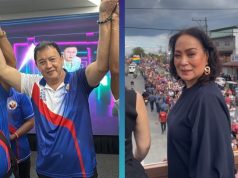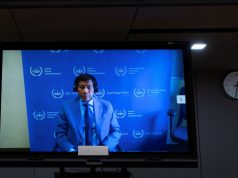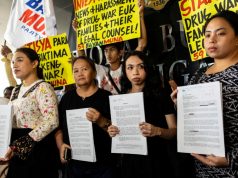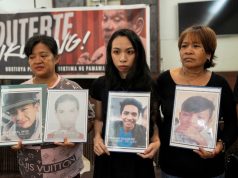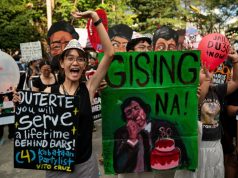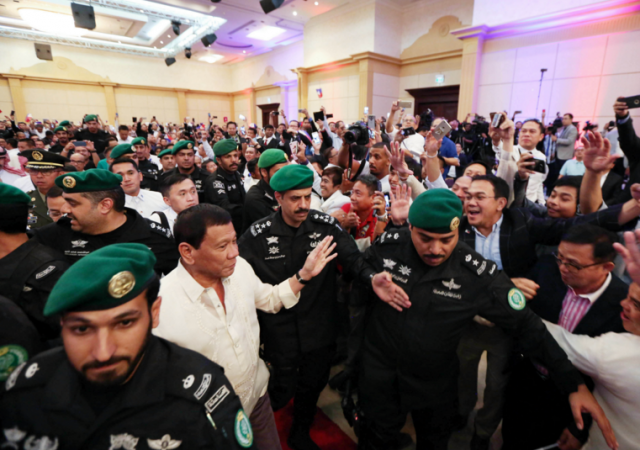
InterAksyon | Jen Calimon and J.V. Arcena, News5
(UPDATE 4 – 11:18 p.m.) MANILA, Philippines – While President Rodrigo Duterte was able to bring home with him 118 Filipino undocumented and distressed Filipino workers from Saudi Arabia, thousands more, who lost their jobs following the oil crisis in the Middle East, remain in the kingdom.
Department of Labor and Employment Secretary Silvestre Bello III said the Philippine government’s target was to bring back a total of 6,000 Filipino workers from the Arab state but only 3,000 of them had so far applied for repatriation.
Most of the Filipino workers who came home with the President on Monday availed themselves of the Saudi government’s amnesty program. The workers returned to the country with 20 children.
Duterte promised that the Philippine government would pay for the repatriation expenses of overseas Filipinos who want to go back home.
“Lahat ng gustong umuwi na Filipino, makakauwi. Gagasustan natin ‘yan,” the President said upon his arrival.
Most of the stranded Filipino workers in the kingdom remain unpaid as employers hit hard by an economic slump withheld their income for months. Many of them have expired iqama or residence IDs and are technically staying in Saudi Arabia illegally, with some unable to afford even the fare to go to the embassy.
Among them was 56-year-old Rizalino Jacinto, who died in August 2016 with his wages still unpaid for eight months. His wife said Jacinto, who was in coma after suffering massive cerebral hemorrhage, died of severe depression.
Foreign governments had been pressing authorities and executives in Saudi Arabia to ensure that local construction firms make delayed salary payments to thousands of workers.
Since 2015, the Saudi government has responded to shrinking oil revenues by clamping down on state spending to curb a budget deficit running at about $100 billion annually.
This had squeezed construction firms in the kingdom as they had received less money from the government.
About 10 million people, largely from South Asia, Southeast Asia and other parts of the Mideast, work in Saudi Arabia.
Most of them do low-paid jobs in sectors which Saudis spurn, such as construction, domestic service and retailing.
On Monday, upon his arrival from a week-long visit to Saudi Arabia, Bahrain, and Qatar, Duterte thanked overseas Filipino workers (OFW) for helping the Philippine economy and promised that he would also help them with their needs.
“Gusto ko na minsang lumuhod. Really I felt like going down on my knees. Thank you for helping the country. Malaki ‘yan. Di n’yo lang alam. Malaki ang tinutulong ninyo sa bayan [That’s a big thing. You just don’t know how much you helped the country]. Your remittances, that keep us afloat. During the years of crisis, remittances buoyed the economy,” he said.
“Tutulong ako sa inyo bilang pagbayad sa ginawa ninyo sa kababayan ninyo. Magpapakamatay kami [para] sa inyo [I will help you in return for what you did for our countrymen. We will give up our lives for you],” the President added.
Total OFW remittance sent through banks in December 2016 rose 3.6 percent to $2.56 billion from $2.47 million during the same month in 2015.
For the whole of 2016, cash remittances reached $26.9 billion, up 5 percent from $25.61 billion in 2015.
On Monday, the government announced that the 151 repatriated OFWs from Saudi Arabia were each given P10,000 financial aid – P5,000 from the Overseas Workers Welfare Administration and another P5,000 from Duterte.
He also promised that he “will look for the money” to build a hospital in the Middle East to take care of the health needs of Filipino workers there. But Bello said that, for now, Philippine government could only send additional doctors to the region.
During his official visit to the Middle East, Duterte disclosed to OFWs his plan to establish a Department of Overseas Filipino Workers. At least seven bills are now pending in Congress that propose the creation of the said agency.
In the 1970s, labor migration was just seen by the Philippine government as a temporary solution to unemployment and insufficient foreign exchange earnings while the domestic economy was being strengthened to provide sustainable local jobs to Filipinos.
But the supposedly temporary solution became a permanent answer to increasing joblessness when the Philippine government, during the Marcos administration, institutionalized the overseas deployment of Filipinos.
In 1982, President Ferdinand Marcos, through Executive Order No. 797, turned over the functions of three agencies that train and select Filipino workers for deployment abroad to the Philippine Overseas Employment Agency. – with reports from Reuters
Click and watch the video report from News5’s JV Arcena below:




